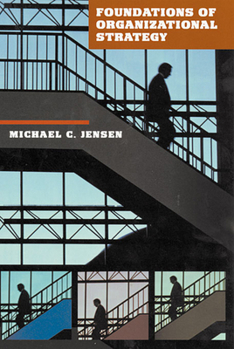Foundations of Organizational Strategy
Select Format
Select Condition 
Book Overview
In this volume, Michael Jensen and his collaborators present the foundations of an integrated theory of organizations. The theory assumes that organizations are equilibrium systems that, like markets, can be influenced, but cannot be told what to do; that human beings are rational and self-interested for the most part; and that information is costly to produce and transfer among agents. The theory also treats business organizations as entities existing in a system of markets (including financial, product, labor, and materials markets) that must be considered in the formulation of organizational strategy.
Jensen argues that the cost of transferring information makes it necessary to decentralize some decision rights in organizations and in the economy. This decentralization in turn requires organizations to solve the control problem that results when self-interested persons do not behave as perfect agents. Capitalist economies solve these control problems through the institution of alienable decision rights. But because organizations must suppress the alienability of decision rights, they must devise substitute mechanisms that perform its functions. Jensen argues that three critical systems, which he calls the organizational rules of the game, are necessary to substitute for alienability in organizations: (1) a system for allocating decision rights among agents in the firm, (2) a system for measuring and evaluating performance in the firm, and (3) a system for rewarding and punishing individuals for their performance. These concepts offer a major competitive advantage for organizations.Format:Paperback
Language:English
ISBN:0674005643
ISBN13:9780674005648
Release Date:March 2001
Publisher:Harvard University Press
Length:430 Pages
Weight:1.40 lbs.
Dimensions:1.1" x 6.1" x 9.2"
Customer Reviews
2 ratings
Good Cross-boundary book
Published by Thriftbooks.com User , 24 years ago
This is an excellent book that is good for both academics and practicioners. Practicioners may find the indepth theory discussion a bit cumbersome, but it is worth the read to find the gems of wisdom.The book is an excellent coverage of the basics of organization theory, covering enough economic theory to have it make sense.An excellent book for graduate students that want to study organizations. Even if you are not an economics student, it will help you understand the language that the economic organizational theorists use.
This collection of articles has only one weakness: its title
Published by Thriftbooks.com User , 26 years ago
Between the covers of this dryly titled and presumably tedious tome is a lively collection of a dozen essays spanning over twenty years of original thinking and outstanding scholarship by one of Harvard's foremost professors. Jensen, with a bit of help from colleagues such as Eugene Fama, Kevin Murphy, and the late William H. Meckling, attacks such diverse issues as the nature of man, the theory of the firm, residual claims and organizational form, agency costs, executive compensation, and organizational performance measurement. In the author's words, "Economists have historically concentrated on the analysis of markets while treating the organizations in them as black boxes that act as profitmaximizing entities, (and)...behavioral organization theorists have largely focused on the internal aspects of organizations, ignoring the forces of markets in which those organizations exist." In this collection, Jensen bridges these two disparate views, utilizing rigorous economic analysis to forge a superior understanding of both the firm and the individuals who are its employees, partners, and owners. Organizations, at the most basic level, are networks of individuals drawn together to accomplish a task. The most appropriate place to start is with a robust theory of the individual. Economists are typically accused of viewing individuals only as money-maximizing entities ("economic man"). Jensen demolishes this with an integrative model of the individual as resourceful, evaluative, and maximizing, or REMM. Four postulates exist in the REMM model: Every individual cares, each individual's wants are unlimited, each individual is a maximizer, and the individual is resourceful. The REMM model is contrasted against basic economic, sociological, and psychological models. The REMM model, a fusion derived from features of each, dominates each of its sources in explanatory power of behavior. From this base, Jensen proceeds to explore diverse topics, including specific and general knowledge, and the role that knowledge possessed by individuals plays in organizational development and behavior, alienability of decision rights, residual claims and agency theory. Two of the dozen articles review how residual claims influence organizational structure. For example, Jensen observes that, in the financial industry, insurance companies and savings banks have been organized as "mutual" organizations in which the policyholders or depositors are the residual claimants, whereas commercial banking has nearly always been organized as stock companies. Further, professional services organizations have typically been organized as partnerships. There is no marketbased reason why an insurance company should choose to be a mutual rather than a stock company, or why a professional services firm could not be organized as a stock company with public ownership (as some have done or are considering). The role of the residual claimant, however, p





